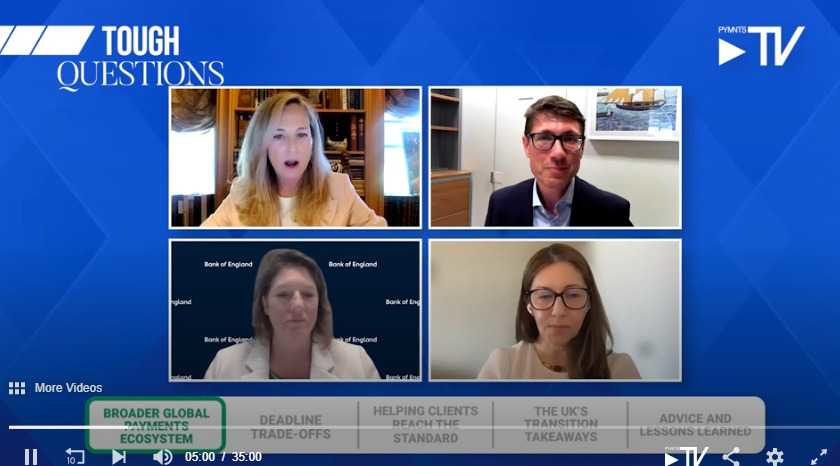When it comes to embracing new ways of doing things in payments — adopting standards, fostering new use cases — boring is good.
Boring implies there have been no hiccups with the interplay between businesses and financial institutions (FIs). No surprises on the way to building resilient new systems that get the current payment landscape, and legacy systems, ready for tomorrow’s new demands.
In recent months and years, countries, governments, enterprises and FIs have been pivoting to faster payments.
Along the way, they’ve had to get ready for, and adopt, modern and global payments language called ISO 20022. The standard promises to turbo-charge a digital world of B2B and consumer-facing commerce that is always on and always connected, 365 days a year and 24 hours each day.
The adoption of the standard has not been without its challenges, as implementation deadlines have been stretched out and pushed back. It all underscores the complexity of the migration.
But a trio of payments experts told Karen Webster that some recent go-live announcements show that the technical challenges are surmountable, and the benefits are considerable.
Panelists included Gloria Vargas, global accounts and financial services at AWS; Oliver Northern, international payments product manager at Bank of America (BoA); and Elizabeth Leather, policy manager at the Bank of England (BoE).
The migration to the ISO 2022 standard means that more data is traversing payments infrastructure and accompanying payments than ever before. That data can be used to make sure the transactions and parties are in compliance with anti-money laundering (AML) and sanctions screening. The greater transparency also means that corporates and FIs have better visibility into their own cash flows.
As Leather remarked, “there’s a huge appetite to benefit from the increased amounts of richer data and structured data that can be sent across the payments network.”
That desire extends to cross-border transactions, as straight-through processing can streamline payments and invoice reconciliation, and structured/semi-structured addresses can improve sanctions-related overseeing of transactions.
“We are facilitating conversations between corporates, and hopefully in the future between corporates and participants and [enterprise resource planning (ERP)] providers to talk about data choice and harmonizing those choices,” Leather said.
The conversation came against a backdrop in which the global rollout of ISO 20022 is being delayed and is taking place in stages. In June, the BoE said it had successfully migrated CHAPS, the United Kingdom’s high-value payments system, to ISO 20022. The BoE said at the time that the migration marked a “significant milestone” in the long-standing bid to renew the bank’s Real Time Gross Settlement (RTGS) service.
That migration came amid collaborative efforts with BoA and was completed over the course of a single weekend, Leather said.
As to the “boring is good” argument, BoA’s Northern noted that the migration had “gone exceptionally well,” following on the heels of “going live” with ISO 20022 in Canada, Australia and the SWIFT network.
“There were some bumps over the first couple of days, but payments were processed as expected, and we delivered for our clients,” Northern said. “We’ve learned as we have gone along.”
That learning has taken shape as BoA clients have been testing BoA’s “lower lanes,” so clients can send the bank ISO data (including end users’ data) that can be validated to ensure that straight-through processing works and back office reconciliation improves.
Not all firms have had a “boring” experience. AWS’s Vargas noted that her firm has worked with different types of entities across a range of geographies, and the constant challenge has been to “keep the environment running with no issues, and without affecting the customers by that transition.”
The initial focus has been to support the new messaging, even if the entities were not taking advantage (yet) of all the new structured data fields. Many customers have been leveraging the cloud to collect and ingest Big Data and use machine learning to predict if the data that travels with transactions will be accepted.
As structured data becomes common, Vargas said, “banks will be more willing to share data among themselves.” As a result, AML, fraud detection and sanctions screening will improve. FIs will be able to provide differentiated services more adroitly — including microservices — to their end users as they re-architect their applications.
There remain two years (roughly) to complete the transition to ISO, noted the panelists, and as North said, “many participants are already deriving some level of benefit from ISO,” particularly when the SWIFT transaction manager goes live and ensures data integrity across the SWIFT network.
And, as 2025 looms, BoE will see more FIs migrate, with an eye on interoperability across the globe, Leather said. (Forty percent of the BoE/CHAPs business is cross-border.)
“You will get movement between the different financial market operators to update [systems] and continue to move forward,” Leather added.
Regarding the alignment of data and interoperability globally, Northern said: “If we are able to achieve that as an industry, I think we would’ve done exceptionally well.”
Added Vargas: “We do have work to do in the future to ensure that we are actually making the changes to the environment ... and the core infrastructure of the entities to take advantage of that new set of data. Things are going to be more exciting and maybe a little bit less boring in the next few months as we really take advantage of the promise of ISO 20022.”











 All while Pfizer—a company with a $2.3 billion criminal fine for fraudulent marketing, bribery, and kickbacks—was given blanket immunity from liability and billions in taxpayer dollars to produce a vaccine in record time with no long-term safety data.
All while Pfizer—a company with a $2.3 billion criminal fine for fraudulent marketing, bribery, and kickbacks—was given blanket immunity from liability and billions in taxpayer dollars to produce a vaccine in record time with no long-term safety data.
























